Marion Ein Lewin and Steven Hess
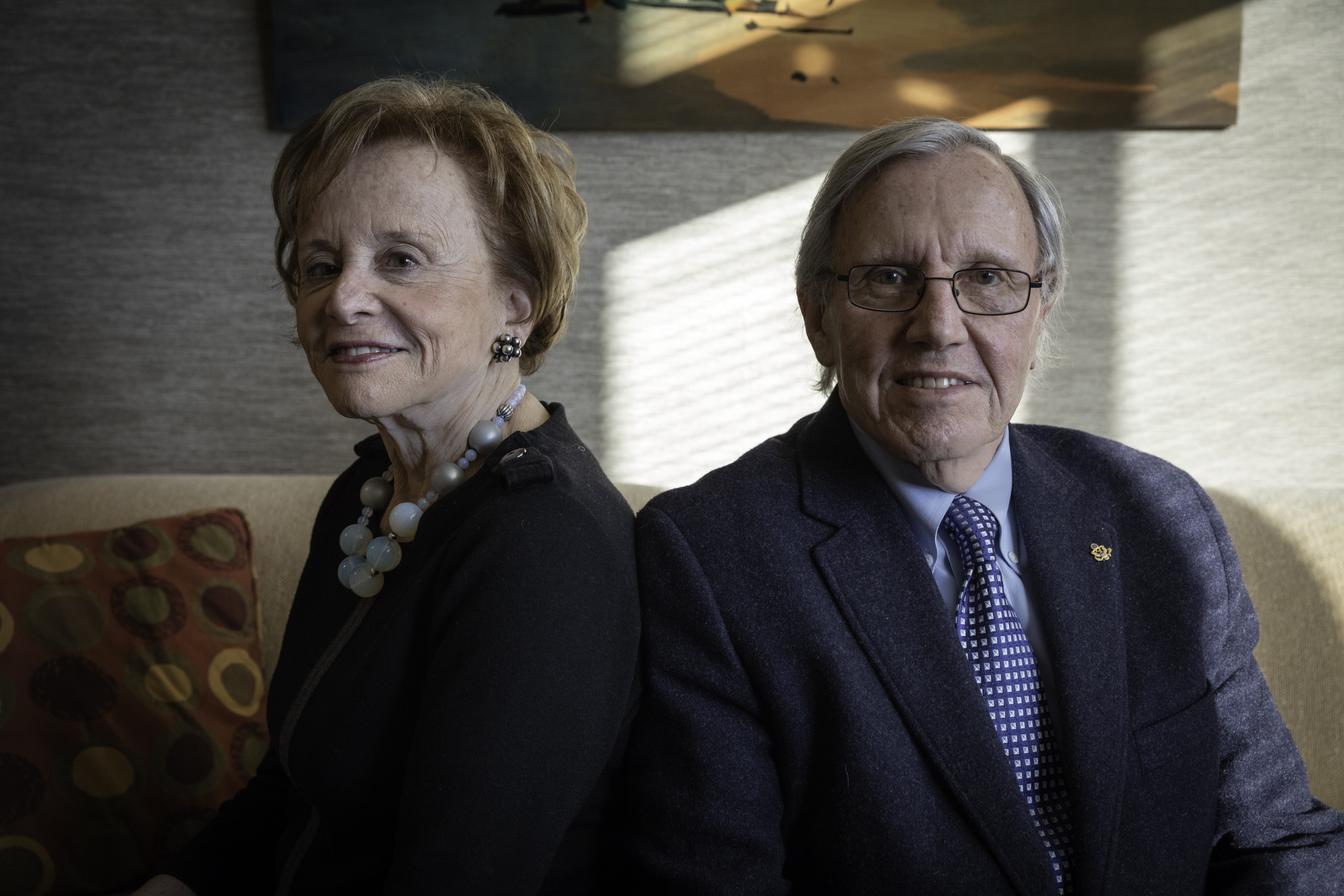 Marion Ein Lewin and Steven Hess. Photo credit: Michael J. Lutch
Marion Ein Lewin and Steven Hess. Photo credit: Michael J. Lutch
A Life Profile
BY GAIL WEIN
Marion Ein Lewin and her brother Steven Hess were born 45 minutes apart on January 14, 1938, in Amsterdam, Holland. They are among the few sets of twins who survived the concentration camps and at this point quite possibly the last.
Steven’s earliest memory is from around age five. “I was in a field with my sister lying on a blanket between two suitcases. I remembered it distinctly, but I had no memory as to why.” Later, Steven’s mother gave the scene context. She told him that they had been arrested and were waiting in an open field to be transported. It was cold and blustery and she used the two suitcases to protect the children from the wind.
Marion’s earliest memory was the night when the Nazis and the Dutch police raided their home in Amsterdam to pick them up for deportation. The family was told to get dressed and get out quickly. Marion wanted to get her and Steven’s daily treat – candy that their mother placed in a wooden Dutch shoe each evening, but there was no time. “I vividly remember the night we were picked up, and the horror of it,” said Marion.
Steven also recalled that they, like most Jews, had suitcases by the door. “You’d only pack what you could carry, and you’d only pack what was really important: some food, some photographs, some clothing, some jewelry, maybe money, and it was always by the door because you never knew when the knock would come.”
Though they did not understand this at age four, the children’s lives had already changed – they weren’t allowed to go school or out to play. Steven remembers that all the shades in the house were drawn. “When the war started and the Nazis invaded, all the homes were required by law to be blacked out, so allied bombers couldn’t easily detect them. I was peeking out from the black drapes to see the ‘fireworks’ in the sky, having no idea what they were. My mother would keep pulling me away from this fascination.” He also recalls, “the physical memory of being dragged from your house into the street, into chaos with trucks and lights.”
Marion and Steven’s parents, Ilse and Charles, were Germans who, in 1936, fled to Holland as the terror of the Nazi regime mounted. The previous year, the Nazi Nuremberg Laws were passed, which made employment essentially impossible for Jews. Steven explains, “There was no barrier on Jews leaving Germany – quite the opposite – Hitler wanted to get rid of the Jews. But no country wanted them and they could not take any of their belongings. The people who had less to lose or felt more directly threatened were among the first to leave.”
The twins’ father was a well-established businessman. “My father arranged and paid for his sister, brother-in-law, and parents to all come to America, but he stayed because he was very invested in the status quo. He was well-to-do, and at some level, believed Hitler would not last,” said Steven.
Westerbork
The Hess’s were unusual in that they managed to stay together – and survive – as a family through deportation, more than a year in a concentration camp, and liberation. “But,” Steven remarked, “ultimately it mostly depended on luck.”
When the family was taken from Amsterdam, Marion, Steven, and their mother were sent to Westerbork, a “transport camp” in the northeastern part of Holland. Their father, who had not been caught, approached the head of the German occupation in Amsterdam and said, ‘You’ve taken my family; I want to join them.’
“But oddly my father was not shipped in a cattle car like the others; they put him in a premiere train,” said Marion. “My father arrived in Westerbork on a first-class train; his special punishment would come later.”
“It was like a sea of displaced humanity,” Marion recalled of Westerbork. In the beginning, there were schools that were set up by the Jews, and theatres and concerts. “They tried to replicate a small semblance of normal life.” Both children remember the unsanitary conditions of the camp; it was full of flies and endless mud. Steven was always sick with ear infections and was often in the hospital there.
“There were children and you played, but the whole camp was very much like what you’d imagine a town in the old West. The streets were all dirt and the place was filthy. At any time there were 10,000 people there, but every Tuesday a trainload of Jews were shipped out ‘to the East,’” said Steven. “I also remember when it was cold there, it was so cold, and when it was hot, it was so hot – you were always miserable,” added Marion.
“There was always this feeling of gloom and great uncertainty because of the trains and weekly deportations,” said Marion. “All the conversation was about the trains that left every Tuesday, and the terror of being on the list for the voyage to nowhere. At the time I don’t think people really knew where these trains went. In the beginning people were led to believe they were going to farming communities much like a kibbutz. Many arrived in Westerbork with newly purchased farming shoes.”
“Life revolved around trains and the railroad track and depot that bisected the camp,” said Marion. “It was like a lottery every week. Even as a young girl I remember the wails and tears of those who were forced to leave and the sadness and grief of families suddenly torn apart to places unknown. And then as soon as the train left, the cycle of anguish and terror began all over again.”
Transport to Bergen-Belsen
The Hess family was put on a transport to Bergen-Belsen on February 15, 1944, which, ironically, was their parents’ tenth wedding anniversary. Their father had determined that the family could not remain in Westerbork, because he knew that in the end, everyone would be shipped away. The destinations were just unfamiliar names, but one was a place called Bergen-Belsen in Germany. He reasoned that that would be the one to try for, if the family had any control in the selection process; they could speak German and they would be closer to home when the war ended. Of the approximately 105 trains that departed Westerbork during the war, just seven went to Bergen-Belsen. All of the others went to extermination camps.
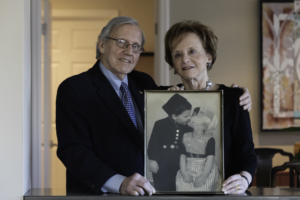
Marion Ein Lewin and Steven Hess hold a professional photograph of them, dressed in traditional Dutch costumes, from about a year before they were deported to the Westerbork and Bergen-Belsen Concentration Camps. Sometime after the photo was taken the Nazis caught the photographer, whose surname was Fisher, making false ID papers and shot him. Photo credit: Michael J. Lutch
“It was just, for lack of a better word, serendipity. It was the only camp that my sister and I would have survived more than an hour, because it had no gas chambers,” said Steven. “The week before we were deported from Westerbork, they emptied the children’s hospital and all these pitiful kids were thrown on cattle cars to Auschwitz. Just by pure happenstance I was not in the hospital at that time.”
The Hess’s train stopped at a place called Celle, unloading the prisoners a few kilometers from Bergen-Belsen. Marion remembers the very long walk from there, and Steven – a dog lover then as he is now – jumped off the train and ran to pet one of the German shepherd guard dogs. “My father ran after me and one of the German soldiers said ‘Stop or I’ll shoot.’” Steven’s father boldly told the soldier to go ahead and shoot, but he was going to get his son. Charles was German, he looked German, and of course spoke as a German. “The soldier remarked on his ‘guts’ and told him to grab me and get back in line.”
At Bergen-Belsen
Steven has a vivid memory of the living conditions at Bergen-Belsen. People in the barracks slept two to a bunk, with the wooden bunks stacked three high. “They were unheated and the climate in Bergen-Belsen was like Rochester, New York, where I live now – fine in summer and spring but terrible in winter. If you lost your shoes, you died; it was as simple as that. You wore everything you owned or it would be stolen by other prisoners,” he added.
“The mattresses were full of lice, so the people burned the mattresses for fuel to get some heat but then you slept on the wooden slats, and the fuel was gone. The boards were crosswise in the bunks and people would take out some of the boards and use that for fuel too, so the spaces between the boards got bigger and bigger, and they would dig into your bones because you had no flesh,” recalled Steven. Marion added, “Everybody wanted to sleep with us, because we were little and skinny and the bunks were very narrow. People just told us where to sleep.” Steven said, “I was bunked with a very large woman and one morning she was dead, and I just remember it was one of my better days because I actually had the space to myself.”
All of the prisoners wore their cup on a piece of string around their neck or attached to their clothing; if you lost your cup you didn’t eat. The only food was kohlrabi, (a cabbage-like vegetable) made into a soup, with a little horsemeat from time to time. “People became educated to camp survival. If you were at the front of the line and the horsemeat was at the bottom, you got nothing,” said Steven. “If you were in the middle of it, you could hope to get some meat, but if you were at the end, it could be empty by then.” The food was doled out from corrugated steel bins the size of a large garbage can. The children learned how to reach inside the bin and catch some extra food from the grooves of the corrugated sides.
Besides Marion and Steven, there were not that many youngsters at Bergen-Belsen. Almost all of the children at Westerbork were sent to Sobibór or Auschwitz, where anyone under the age of 15 was gassed upon arrival. Despite the deplorable conditions, the children found a few ways to amuse themselves. The siblings invented their own secret language, as twins sometimes do, with rhyming words similar to Pig Latin. Marion remembers playing with whatever was at hand, “When you took the lice out of your head, they made a snapping sound, like a little click. So we would have this game, popping them and lining them up, like a Monopoly game.”
Another game sounds gruesomely macabre: the children would count the number of dead bodies that were piled outside the barracks. “We learned to count on bodies. There’d be a head on an arm and you’d try to figure out which arm belonged to which head. It was normal. We never thought that was unusual,” Steven said.
Constant Fear
One day, the twin’s father endured a brutal beating. He was tortured by the guards, thrown into a cesspool, and dragged through the camp. After, he was brought into the hospital, and Ilse managed to get a work assignment there cleaning the filth so she could be with her husband. He was so badly beaten that at first she only recognized him by his wedding ring.
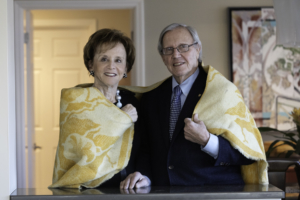
Marion Ein Lewin and Steven Hess hold the blanket that Marion had with her in the Westerbork and Bergen-Belsen Concentration Camps. Photo credit: Michael J. Lutch
In spite of his horrendous condition and no medical care whatsoever, their father survived. Marion remembers seeing him at the hospital and helping him shave. “He always wanted to be dignified because he felt to look defeated was to indicate that you no longer had the spirit. We found the top of a can where he could see his image and I would hold it up to him – God knows what he shaved with.”
Their father’s beating was just one event of many that kept a cloud of dread over Steven and Marion. Marion remembers living in a constant fear, “Every day, you didn’t know if you were going to live or die. For example, there was Appell [roll call] every day, where everyone had to line up outside for hours to be counted, often in the rain or the freezing cold. And then, if you did the slightest thing they would call you out and that was the end of you.” Steven added, “At Appell hundreds died, because you were standing in the freezing cold with in rags. People just sagged, and then they’d start the counting again. It was a formalized torture. We were surrounded by dead bodies, so it wasn’t much of a leap to think, ‘am I next?’ without intellectualizing it.”
For the twins’ seventh birthday, on January 14, 1945, their mother Ilse bartered the one piece of jewelry they had left – her husband’s wedding band – for two slices of bread and butter, with chocolate sprinkles. “We shared this miracle sandwich and we ate it over many weeks, crumb by crumb,” Marion remembers. For many years afterward, well into her teens, Marion said, “I could never really fall asleep at night, even here in lovely America, because I felt I had to stay up to make sure that I was alive in the morning. I always slept with food at the foot of my bed, for years, bread, sausage, and other stuff.”
Liberation
As their father was recovering from his brutal beating, the inmates became aware that the war was coming closer. Steven recalls “there were always airplanes overhead late in the war, and you always heard cannon fire. People did know that the war was coming our way.”
On April 10, 1945, three trains were loaded with many of the remaining prisoners at Bergen-Belsen, about 6,000 people, to be sent east. The family was locked on the train for 14 days, during which 675 people died. The train constantly stopped because American and British bombers and fighter planes blew up the tracks, having no way of knowing that the trains held prisoners from the concentration camps. Each time the train stopped, their father would climb out, crawl to any nearby farm field, and return with whatever he could steal – some potatoes, anything edible. Ilse only fed the children after dark, for fear the other prisoners would take their food.
“My mother had a little Sterno stove, and my sister and I would go to the steam engine and hold a cup where the steam came out to get water. My mother would pull grass out of the siding and make soup with grass and whatever we had.” said Steven. “We actually ate leaves from trees. By that time, we weren’t particular,” added Marion.
One day, their father didn’t return in time, and the train left without him. He survived by tearing off the Jewish star from his shirt, and getting into a Red Cross line for food. Since he was German, he blended in with the other Germans. He wasn’t wearing a prison uniform, and by 1945 the Germans themselves were mostly bedraggled. He snuck onto another train, and then hid under the station, miraculously spotting the train that held his family.
In the Village After Liberation
Ultimately, Russian soldiers on their march from the East to the West freed the train in a small East German village, Tröbitz. The family found an abandoned farmhouse and took it over. “The Russians had only two interests, rape and murder. My mother couldn’t leave the house because the Russians were crazy,” said Steven.
The family was in Tröbitz for eight weeks. There, the children experienced some very commonplace things for the first time in a year and a half: toilet paper, toothbrushes, and a bathtub (with running water!). And it was the first time they could remember that they slept in a real bed. “I do remember what a weird feeling it was to sleep in a bed,” said Steven. Marion added, “I remember it was white and I said, ‘I don’t want to sleep in anything that looks like that,’ it was so unusual.”
It was also the first time the children saw flowers. “To me they were like total miracles,” said Marion. “There’s never been a day in my life where I haven’t had fresh flowers because I always think of that, the discovery of life.”
Returning Home to Amsterdam
After about eight weeks, a convoy of American trucks arrived in Tröbitz. It was the children’s first encounter with Americans and some cultural differences were apparent. Steven recalls his surprise at seeing a person of African descent for the first time. With utter disbelief, he thought the man was ‘Zwarte Piet,’ the black-faced helper of St. Nicholas, the Dutch Santa Claus. The first words the children learned in English were ‘Hershey Bar’ and ‘chewing gum,’ the treats that they begged the American soldiers for.
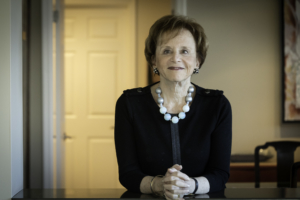
Marion Ein Lewin. Photo credit: Michael J. Lutch
The Americans took the family and the other freed prisoners to Leipzig. From there the Hess’s were taken to Holland, but they were put into a concentration camp with Nazis and Dutch collaborators because the Hess’s were German. “My father made a huge fuss and got a lawyer and we were freed after ten days,” said Steven.
The family remained in Amsterdam for a year, planning to go to America. The week of their departure Marion developed an eye infection, and the Dutch consul nearly cancelled their travel papers.
Coming to America
“We came on January 1, 1947, crossing the ocean in a third-class cabin on the Queen Elizabeth. My parents woke us up at six in the morning as the ship passed the Statue of Liberty, which meant nothing to us at the time,” said Steven. “Now I get very emotional about it, but at the time it was just cold.” Upon the ship’s arrival to New York, the children sat on the pier all day with the luggage and the other immigrants who were on the ship. Finally, late in the evening, the children’s aunt and uncle came to get them.
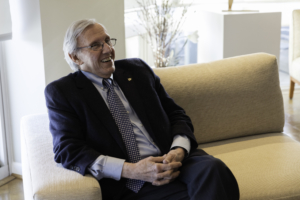
Steven Hess. Photo credit: Michael J. Lutch
“When we came to America, for the first six months my brother and I were like the poster children of refugees. There was a lot of fascination with the Holocaust and survivors; and we were nine and had never been to school. We were the ‘show and tell twins,’ meeting the head of the U.N., lunching with Eleanor Roosevelt, being on the Voice of America, even meeting the head of Chinatown; when I think we just wanted to be kids.” said Marion. The children were initially placed in the kindergarten class, despite their age, because they had not ever attended school. “I remember the school, which was mostly African-Americans, P.S. 169 in Queens, and I remember everybody wanted to show us something or take us somewhere,” she said.
The children were sent to summer camp – though at first the word ‘camp’ terrified them because of its connotation. “Summer camp was an instant indoctrination into American life,” said Marion. “For me it was all magical, like being transported to another planet – to not be hungry, to not be filthy, to have a choice about what you ate, to sleep in a bed. Up to this day, at least once a day, I have a thought like that, ‘Oh my God, I am blessed.’”
Steven said, “I remember the first time we went to a restaurant. I had emptied the bread roll tray and stuffed all the bread in my pockets. My mother tried to explain I no longer had to do that. To this day I cannot throw out a piece of bread. Years ago, the microwave broke and I went to buy a new one and put the old microwave in the basement for the garbage. Behind it was this piece of stale bread, and my former wife went to put it in the garbage can and I said, ‘Don’t throw it away, I’m going to eat that.’”
College and Beyond: Marion
“My parents could only afford to send one child to an out of town school so we split the difference; we were commuters. We lived in Queens, I went to Barnard and my brother went to Columbia.” Marion studied political science and history and became a teacher for the accelerated classes in the public schools in Queens. “At one point I wanted to go to law school. I got into law school, but then I was engaged to someone who was in medical school, so somebody had to make a living,” Marion explained.
Marion and her first husband, a physician, lived in New York where they had two children. The family then spent a few years in Boston and then relocated to the Washington, DC, area. There, Marion found her calling in a career in public policy. “Through great good fortune and serendipity I got a job, having no background, really, working on Capitol Hill for a New York congressman involved in health policy.” Subsequently, Marion had a series of interesting jobs, including positions at the American Enterprise Institute and the Institute of Medicine at the National Academy of Sciences.
Marion’s two sons are both successful businessmen in venture capital, and her stepson is a psychologist. All – including one grandchild – live in the Washington area. Marion attended a performance of Defiant Requiem: Verdi at Terezín at the Kennedy Center in Washington and found the history and making of it extremely moving and compelling. Impressed with the mission of the organization and the people involved with it, she now serves on The Defiant Requiem Foundation’s Board of Directors.
College and Beyond: Steven
Steven got a degree in history at Columbia, during which time he also joined Navy ROTC. After college he became a commissioned officer in the Navy and had a particular talent for writing and publicity. “I got a lot of publicity for the ship,” recalled Steven. “I had the opportunity to become the press officer for the whole naval district in New York and worked at night in The New York Times, because I wanted to be a journalist. So I started at The New York Times and quit when I was told I had to join the union.”
Though Steven was only a copyboy at The New York Times, he had at least one high profile moment of glory. “A submarine, the USS Thresher, sank in 1963, with all hands lost, and the Times was going crazy getting the piece together and they said, ‘Get a hold of the Navy press officer,’ and they were dialing and dialing, and one guy said, ‘That’s him over there.’”
“I spent all night there reading copy for accuracy and they wrote a whole story about me: ‘Sir by day, boy by night.’” The next night Steven was doing the same for LIFE Magazine late into the night.
Steven then got a job as advertising manager at Western Electric and moved to New Jersey. There he spotted an ad in the newspaper that seemed to fit him perfectly: an advertising manager in the photo business. He became a division president at Berkey Photo and, in 1975, moved to Rochester to run his own photo equipment company.
Steven became a Holocaust scholar in his forties and recalled that in Columbia one of his teachers, the late Fritz Stern, was one of the most eminent scholars of the period, although Steven was not interested in the topic. Two decades later he was reading one of Stern’s books and mentioned to his wife how he had wasted the opportunity to be a pupil of such a brilliant man. His wife encouraged him to look up his former teacher. Steven sent Stern an email about how much he admired his work and received a one sentence reply: ‘Dear Mr. Hess, delighted you finally read the book!’
Steven has four children and seven grandchildren. One son – who worked for him at one point – lives in Rochester, as does his daughter. His other two other sons live in Chicago and New York City.
Epilogue
Marion said, “When I was a young girl, when I first came to America, I felt that wherever I was, when I left the room, someone would whisper to someone else, ‘Do you know she’s a Holocaust survivor?’ and I just wanted to be a regular American and live in the future and not in the past. Until recently, I rarely talked about my background because when I do it is as if a huge black cloud envelops me, humbles me and makes me silent.”
“Now I realize we’re getting older and survivors are dying out, so it’s important to give testimony. But, how do you describe an experience like that, when it was just a pure miracle that you survived? What can I say that gives justice and dignity to the people who didn’t make it? So there’s always that complicated relationship, the gratitude of my wonderful life, together with the deep sadness of knowing that millions deserved the same grace.”

